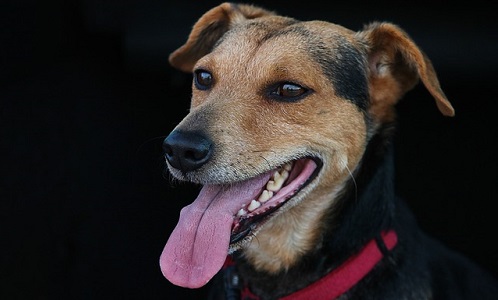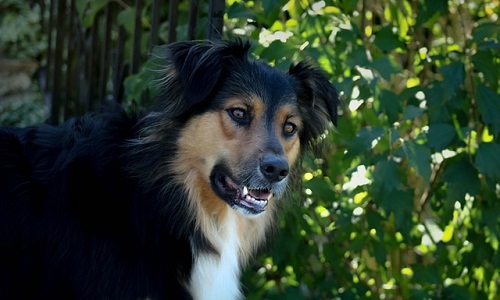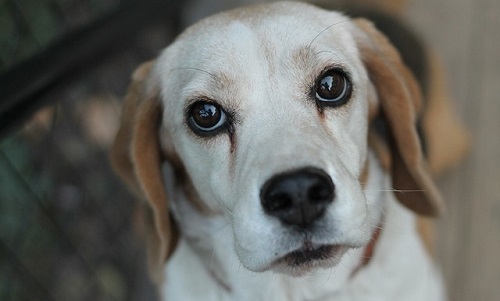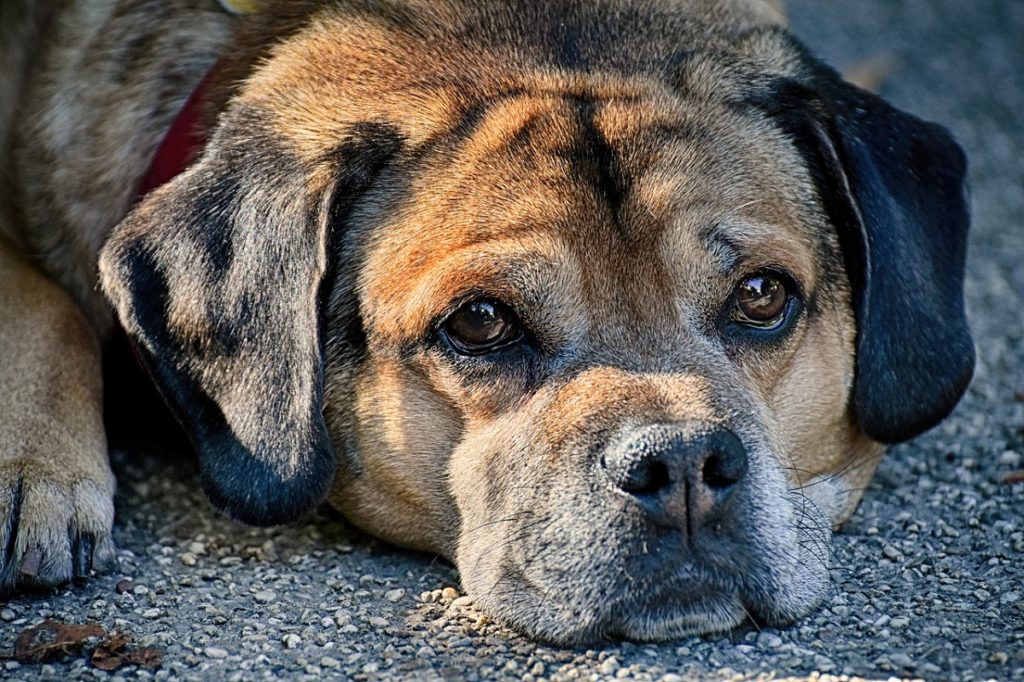When it comes to our beloved canines and their eating habits, it’s really quite simple: dogs love food. Unlike their humans, however, they will eat just about anything first – and leave you asking questions later. Unfortunately, most pet parents have experienced a look from their pooch that says, “Why is this happening to me?” after they’ve eaten something that makes them sick to their stomachs – or worse yet, critically ill. Therefore, it is imperative for dog owners to know the facts when it comes to what foods are toxic to dogs.
While the lists of toxic foods for dogs is long and full of surprises, it is important to know that there are many common foods that are toxic to your dog. Large or small, plump or thin, dangerous foods are everywhere, both inside and outside the house.
For example, in Tennessee recently a beautiful, 85 lb., 3-year-old Husky mix named Canon suffered from canine liver failure and died after somehow ingesting Xylitol, which is used to sweeten chewing gum and other diet foods. Signs that a dog has been poisoned by Xylitol include canine weakness, vomiting, seizures, trembling, diarrhea and acute collapse, according to Pet Health Network.
Canon’s death was reported nationwide. His owners told journalists that they don’t know how or where he ate the food that killed him. The story certainly presents yet another good reason to dispose gum properly rather than spit it out on the sidewalk or grass. It also encourages dog owners to keep an eye out for gum in places where people leave it behind. If you notice that your dog ate gum and you don’t know what to do, it’s always best to call your veterinarian However, gum isn’t the only dangerous food – other items that contain Xylitol include candy, toothpaste and other artificially-sweetened drinks and foods.
Becoming more informed about foods that are toxic to your dog keeps your pet safer and gives you the knowledge needed to act appropriately when toxic foods are present around your dog – or in worst-case scenarios, ingested by your beloved fur baby.
A-Z List Of Foods Toxic To Dogs: Pet Owners Beware
Unfortunately, the list of foods that can make dogs terribly sick or even kill them is quite long. But once you know what they are, it is easy to see how and why they are so dangerous. Although this may not be a complete inventory of foods to keep away from dogs, the following is a list of several well-known foods and ingredients that are particularly dangerous to your very best friend:
- Alcohol/Beer/Hops: Your dog is no match for alcohol: in addition to becoming intoxicated and vulnerable to the unsteadiness and disorientation that humans experience, your beloved pup can even end up in a coma or worse yet, dying from ingesting the hard stuff. Whether it’s in the form of hard liquor, beer or wine, your dog’s liver is unable to process any type of alcohol, which essentially acts as a poison within his body.
- Avocados: While it may be tempting to feed your dog table scraps, don’t. Dogs cannot eat avocados and they can even get very sick if it’s consumed. Forego feeding Fido guacamole toast – avocados are full of persin, a fungicidal toxin that can cause serious problems in your pup’s stomach. In fact, these toxins can result in acute digestion problems for dogs, so be wary when cooking, handling or preparing avocados in your home – this also applies to the garbage, as you’ll want to carefully dispose any leftover food containing the fruit.
 It’s important to note that persin is in the leaves, seeds, bark and fruit of avocados, so people with avocado trees need to keep their dogs away from the area and scattered debris. Additionally, the size of avocado pits (much like a big chunk of corn-on-the-cob, which should also be kept away from your pet due to choking hazard), can kill dogs by getting stuck in their digestive tracts. It’s therefore recommended to keep a watchful eye on your dog when avocados are being served or prepared, whether it’s in your kitchen or outdoors at a family barbeque. The last thing you want is a choking dog or having to witness them becoming ill due to an avocado.
It’s important to note that persin is in the leaves, seeds, bark and fruit of avocados, so people with avocado trees need to keep their dogs away from the area and scattered debris. Additionally, the size of avocado pits (much like a big chunk of corn-on-the-cob, which should also be kept away from your pet due to choking hazard), can kill dogs by getting stuck in their digestive tracts. It’s therefore recommended to keep a watchful eye on your dog when avocados are being served or prepared, whether it’s in your kitchen or outdoors at a family barbeque. The last thing you want is a choking dog or having to witness them becoming ill due to an avocado.
- Caffeine/Chocolate: Many people know that chocolate isn’t good for their dog, but they may not know why. For humans, both caffeine and chocolate contain ingredients that speed up the heart and set your nervous system into overdrive; unfortunately, this goes double or triple for your dog. Depending on how much a dog eats of items containing caffeine and/or chocolate of any kind – the darker, the more dangerous. A dog that has eaten chocolate can lead to symptoms like vomiting, heart palpitations and in worst-case scenarios, seizures or death.
Note: Just like most humans, dogs love chocolate. That means they may eat some no matter what you do to prevent them from getting into it. Check out PetMD’s dog chocolate toxicity meter for helpful information. The toxicity meter can help you better understand how much chocolate (as well as what kinds of chocolate) will impact your pet. If you see that your dog has eaten any chocolate or caffeine, it’s best to act immediately and contact your trusted vet.
- Coconut Water/Sports Drinks/Sodas: Many of the ingredients included in the drinks we consume on a daily basis is overwhelming to a dog’s metabolism. For example, coconut water is too high in potassium for your dog. Sports drinks and sodas are loaded with caffeine, sodium, electrolytes and vitamins that are unhealthy for canine consumption. Quench your dog’s thirst with fresh, clean water instead of sharing your drinks with him when you are out and about, and be sure to bring a portable bowl with you when traveling.
- Fruit Pits and Seeds: Apples, peaches, plums and avocado seeds and pits contain toxins that are poisonous to dogs, as well as people. However, dogs are much smaller, so it takes fewer apple seeds, which produce cyanide when they are eaten, to put them in danger. Therefore, always remove small seeds and pits from fruit, including pits that may pose as a choking hazard, as well as pits/seeds that could become lodged in their intestines.
This also includes watermelon – while this fruit may be a favorite snack for your dog, seeded watermelon is among the list of foods poisonous to dogs. Use sliced, seedless watermelon for a delicious fruit treat. In addition, be careful of the rind when feeding watermelon to your pooch: much like corn on the cob, a big chunk of rind can become lodged in a dog’s digestive tract and cause gastrointestinal trouble. Visit this link for additional information on feeding your pup watermelon safely.
- Garlic/Leeks/Onions/Chives: Garlic, leeks, onions and chives in any form are risky for dogs because they contain elements that kill canine red blood cells. Without those red blood cells, they can develop canine anemia, become weak or have trouble breathing. Always monitor your dog closely when handling or preparing food containing these root vegetables, and be sure not to feed him table scraps that may have traces of these food items. Additionally, watch your dog during walks carefully, particularly if you live in wooded areas where wild onions grow, or near a neighbor’s garden – dogs will eat anything, and it’s not just limited to the indoors!
- Grapes and Raisins: It doesn’t take very many grapes or raisins at all to instigate very sudden kidney failure in dogs; therefore, never feed your dog either food item. In the instance that your dog has eaten either one, vomiting and canine lethargy are common symptoms that signal he’s in trouble and requires immediate medical attention.
- Human Vitamins/Medication: Vitamin supplements are created in human-sized dosages, and are not formulated for canine consumption. However, when it pertains to your pooch, some of the most dangerous ingredients are the high concentration of vitamins and iron found in prenatal supplements. If your dog has eaten your vitamins – or any medication for that matter, whether it’s prescription or over-the-counter – be sure to call your vet right away. In addition, never treat your dog with medications intended for humans. If your dog was prescribed a medication by your vet, be sure to follow their directions implicitly, including dosage amounts and frequency of administration – and don’t be afraid to ask questions regarding your pet’s medical care and prescription regimen.
- Jalapeño/Hot Peppers: While it is common sense, be sure to avoid hot peppers of any kind; this includes cheeses or other foods and sauces containing hot peppers. Dog’s mouths and digestive systems are not designed for spicy foods, which can make them very sick and can even impair their breathing.
- Macadamia Nuts: Similar to the effect of grapes and raisins, it only takes a small amount of macadamia nuts to make your dog critically ill, or worse yet, lead to fatality. This is especially true if this tropical nut is eaten together with chocolate. Even if they’re ingested in small amounts (up to 6 nuts), this food can induce shaking, a canine fever and weakness in your pup’s back legs. If you love to eat macadamia nuts, you might want to consider eating them outside the home just to be on the safe side.
- Raw Meat/Raw Seafood: Most people are under the impression that their dogs can digest raw meat or seafood without incident, but think again. Although your dog may be able to initially eat raw meat without any apparent issues, what they can’t handle is the bacteria that is on meat or seafood. Cooking meat and seafood kills parasites that may otherwise lead to vomiting, fevers and enlarged lymph nodes caused by bacteria. Therefore, keep a watchful eye during meal prep at home, and if you take your dog camping, to a barbecue or on a fishing outing, it’s important to monitor what he’s eating.
- Salt: Please, do not pass the salt to your dog: sodium poisoning symptoms run the gamut from vomiting and diarrhea to depression, tremors, fevers, seizures and, even death in rare cases. Therefore, it’s best not to share your salty snacks with your dog.

- Yeast: Yes, yeast – although it may seem like a harmless substance, it can wreak havoc on your pup’s digestive system. Just as it makes your bread rise, it can also cause mild to dangerous bouts of gas in your dog’s stomach. In addition, rising dough contains alcohol, which is poisonous to dogs.
As mentioned earlier, this list is not exhaustive, but it’s a very good start in knowing how to identify foods and other edible substances that are toxic to dogs, as well as why they’re so dangerous to their health (or how they may pose some other related risk). In any event that your dog has consumed the aforementioned foods, plants and other materials as listed above, be sure to contact your veterinarian immediately.
Common Mistakes Humans Make When Feeding Their Dogs
- Cat Food: Believe it or not, cat food is not equivalent to dog food. Therefore, when you run out of dog food, it’s best to go to the store and get dog food for your pooch. This is because cat food is engineered specifically for a cat’s metabolism, which is different from that a dog’s. Failure to discriminate between these types of foods can lead to canine obesity or pancreatitis in your dog.
- Human Food: Many people cannot resist feeding their dogs what they’re cooking or offering them their leftovers; unfortunately, both scenarios pose a hazard to your dog. Too many fat trimmings, sweets, and even slices of white bread can lead to pancreatitis and obesity. And while cooked chicken or beef liver may seem like a great food for your pet, feeding it to your dog can pile on the vitamin A, which is not good for your his muscles and bones.
- Dairy: Milk is a food that may cause digestive issues in dogs as well as humans, including gassy stomachs and diarrhea. Skip feeding your dog milk from your cereal bowl and limit his consumption of fluids to fresh water only.
- Bones: Pet parents have the best intentions, but it’s actually dangerous to give your dogs cooked bones from foods such as chicken breasts, drumsticks, pork or beef ribs, steaks and so on. Because they are semi-softened, cooked bones can splinter easily and perforate your dog’s intestines. Any meal with cooked bones can be a very expensive, even lethal meal for your dog, so avoid giving your dog any type of bones as a treat. Opt for pet-safe chew toys instead to ensure his safety.
What To Do If Your Dog Eats Toxic Food
If you notice that your dog has eaten something that is toxic, or if your dog is showing any signs of consuming a toxic substance, it is imperative to act quickly. You can call the ASPCA’s Animal Poison Control Center at (888) 426-4435. If possible, share with the person who answers the phone the amount of the toxin that your dog has ingested, as well as any symptoms and behaviors that you observe from your pet. If your pooch is really struggling, bring him to the vet immediately.
Good Habits To Protect Your Dog From Toxic Foods
All of the food and ingredients listed above are found in a myriad of foods and snacks that your dog might beg you to share with. Truth be told, it is best for dogs if their owners decide not to share food or any table scraps from the start, so if you happen to get your dog when he is still a puppy,you can instill good habits early on.
 Because a pup isn’t automatically expecting any type of human food, he is less likely to beg from you, your friends, or strangers for food. By cultivating good habits at a young age, you can potentially protect your dog from eating foods that could potentially cause them to become critically ill (or worse yet, suffer a fatality). Whenever possible, it’s best to feed your dog the highest-quality, nutritionally-dense healthy food you can afford, and do not reinforce begging for other food or unhealthy treats. By doing so, you are actually helping your dog to develop safe eating habits that will lead to a longer, healthier life. In turn, this cuts down on expensive vet bills, as well as not having to take your dog to the vet for accidental food ingestion due to poor eating habits.
Because a pup isn’t automatically expecting any type of human food, he is less likely to beg from you, your friends, or strangers for food. By cultivating good habits at a young age, you can potentially protect your dog from eating foods that could potentially cause them to become critically ill (or worse yet, suffer a fatality). Whenever possible, it’s best to feed your dog the highest-quality, nutritionally-dense healthy food you can afford, and do not reinforce begging for other food or unhealthy treats. By doing so, you are actually helping your dog to develop safe eating habits that will lead to a longer, healthier life. In turn, this cuts down on expensive vet bills, as well as not having to take your dog to the vet for accidental food ingestion due to poor eating habits.
Keeping this information in mind, dogs have a keen sense of smell to sniff out anything that they might perceive to be a tasty treat. Therefore, always keep an eye on them when you’re out on walks, and think twice before leaving anything other than their dog food, safe chew bones & toys within their reach. Ask your friends and dog sitters not to feed them anything they are eating, and explain why that is in the dog’s best interest.
Non-Toxic Safe Human Foods For Your Dog
If you decide to share human food with your dogs, here are some ‘safe’ foods:
Proteins
- Lean cooked meats
- Cooked eggs
Fruits
-
- Apple slices
- Bananas
- Blueberries
- Cantaloupe
- Cranberries
- Mango slices
- Orange slices
- Peach slices
- Pears
- Peeled Pineapple
- Raspberries
- Strawberries
- Watermelon (seedless variety only with rind removed)
Fresh Veggies
- Broccoli
- Brussel Sprouts
- Carrots
- Celery
- Cooked Potatoes
- Cucumber
- Green Beans
- Peas
- Spinach
- Zucchini
Starches
- Cooked White Rice or White Pasta
One last note of precaution: Just as humans suffer from food allergies, your dog may suffer from canine food allergies as well. Be sure to monitor him when feeding him new foods, and ask your vet about his dietary needs and if he has any type of allergies. If you do notice any signs of an allergic reaction that might be due to a food-related allergy (or as a result of ingesting something that may trigger an allergic response), contact your vet immediately for assistance.
Sources Cited:
- Schenker, Michelle. “What Foods Are Toxic For Dogs.” Canine Journal.com, August 24, 2018, https://www.caninejournal.com/foods-not-to-feed-dog/. Accessed October 28, 2018.
- “People Foods to Avoid Feeding Your Pets.” ASPCA.org, (no publish date), https://www.aspca.org/pet-care/animal-poison-control/people-foods-avoid-feeding-your-pets. Accessed October 28, 2018.
- “Top 12 Behavioral Problems in Dogs.” Pets.WebMD.com, (no publish date), https://pets.webmd.com/dogs/dog-behavior-17/slideshow-behaviorial-problems-in-dogs. Accessed October 28, 2018.
- Streisand, Elizabeth Durand; Picard, Caroline. “16 Foods Dogs Can’t Eat – Dangerous Foods That Can Kill Dogs.” Good Houskeeping.com, March 14, 2018, https://www.goodhousekeeping.com/life/pets/g2687/foods-to-never-give-your-dog/. Accessed October 28, 2018.
- Dilonardo, Mary Jo. “8 liquids that dogs should avoid.” MNN.com, January 31, 2017, https://www.mnn.com/family/pets/stories/liquids-dogs-shouldnt-drink. Accessed October 28, 2018.




